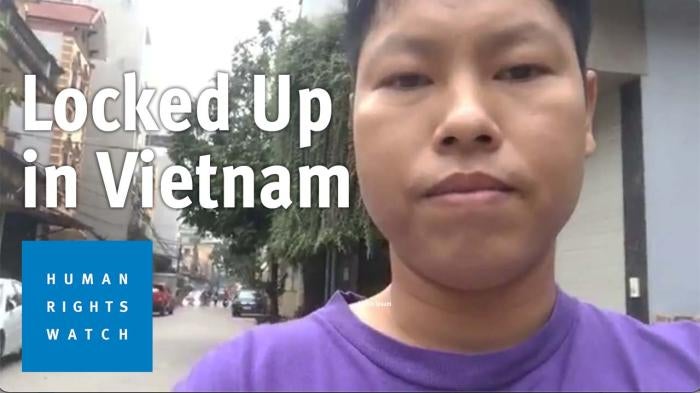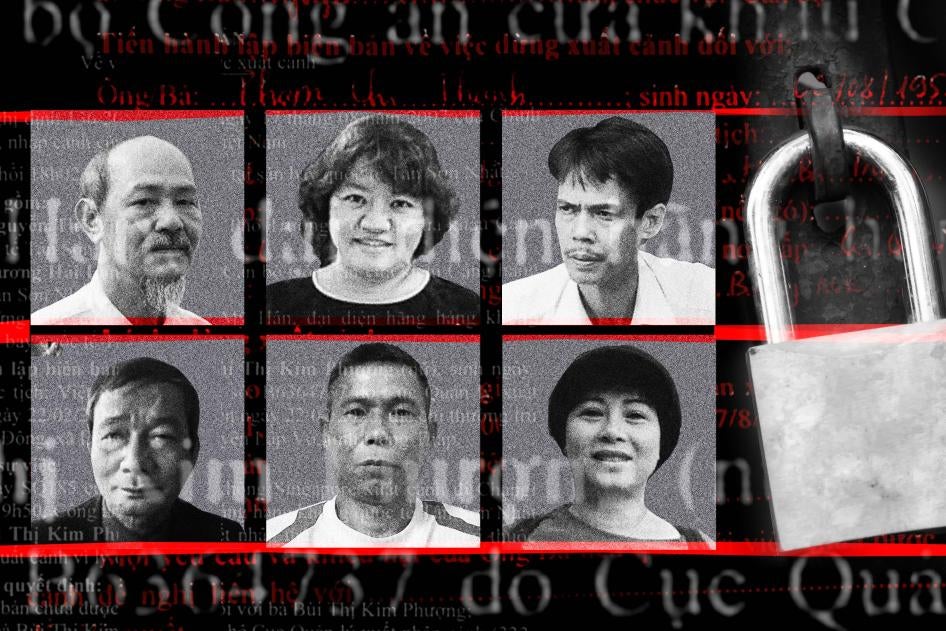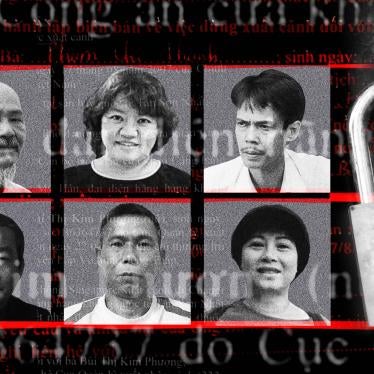(Bangkok) – The Vietnamese government systematically restricts the rights to freedom of movement of political and human rights activists, Human Rights Watch said in a report released today. The authorities should immediately end all restrictions on movement and amend laws that curb citizens’ basic rights to freely travel within, from, and to Vietnam.
The 65-page report, “Locked Inside Our Home: Movement Restrictions on Rights Activists in Vietnam,” documents the Vietnamese government’s routine violation of the right to freedom of movement and other basic rights by subjecting activists, dissidents, human rights defenders, and others to indefinite house arrest, harassment, and other forms of detention. The authorities have detained activists just long enough to prevent them from attending protests, criminal trials, meetings with foreign diplomats and a US president, and other events.
“The Vietnamese government systematically represses civil and political rights, putting activists and dissidents at constant risk,” said Phil Robertson, deputy Asia director at Human Rights Watch. “The authorities employ rights abusing tactics such as holding activists in indefinite house arrest, detention when away from home, and bans on leaving the country under fabricated national security grounds.”
Human Rights Watch documented the systematic blocking of more than 170 rights activists, bloggers, dissidents, and their family members from domestic and international travel, including by stopping them at airports and border gates, and denying passports or other documents that would allow them to leave or enter the country. Vietnamese authorities have engaged in collective punishment, imposing both house arrest and international travel bans against family members of rights activists.
Cases reviewed concerned freedom of movement restrictions between 2004 and 2021. They are based on independent media reports, information posted on social media, independent blogs, websites inside and outside Vietnam, and private communications with victims, their family members, and witnesses.
The authorities have used various methods to keep people under house arrest, including stationing plainclothes security agents outside homes, locking dissidents’ homes with padlocks or even superglue on locks, erecting roadblocks and other physical barriers, and mobilizing neighborhood thugs to intimidate people.
In January 2021, the authorities placed a rights campaigner, Nguyen Thuy Hanh, under house arrest for 10 days during the Vietnam Communist Party’s Congress. She wrote on her Facebook page: “The authorities moved numerous soldiers to Hanoi to guard the Party Congress, yet that did not put their minds at ease. They brazenly robbed us, citizens who did not violate any law, of our rights to freedom of movement, and the police locked us inside our home throughout the entire congress.”
In May 2016, security agents dragged Nguyen Quang A into a car and drove him around to prevent him from attending a meeting with US President Barack Obama to which he had been invited. In some cases, security agents forced activists onto a train or plane to return to their hometown.
Activists and bloggers have also frequently been detained at home during sensitive anniversaries. These include national Vietnamese holidays, commemorations of conflicts between Vietnam and China, and international holidays, such as Human Rights Day, on December 10.
Political events, such as the Communist Party of Vietnam’s Congresses and the National Assembly’s so-called elections, often prompt crackdowns and restrictions. Visiting dignitaries also bring restrictions, including visits by US Presidents Bill Clinton in 2000, Barack Obama in 2016, and Donald Trump in November 2017 and in February 2019 for the Trump-Kim Jong-Un Summit. The authorities also prevent activists from meeting with visiting foreign experts from the UN or elsewhere about human rights-related issues. Because the practice is so pervasive, some activists leave their homes before certain events and temporarily stay at an unknown location. Security agents often intercept them, though.
“The Vietnamese government apparently considers it a crime for some people to attend human rights or freedom of religion events, or meet with visiting foreign dignitaries,” Robertson said. “The authorities should immediately end house arrest and other movement restrictions on rights campaigners.”
The Vietnamese authorities have also routinely prevented activists from leaving or entering the country. The police often stop a traveler at an airport or border crossing. They have denied people’s entry to Vietnam even though they hold Vietnamese passports.
The authorities appear so sensitive to the possibility that activists may meet with foreign officials or exiled dissidents that they prevent them from leaving on personal trips, such as for tourism or to accompany loved ones for medical treatment.
The government does not publish its travel ban list or notify those on the list or let them know how long a ban will last. Rights activists and bloggers may only find out when the police stop them at airports or border gates. In a few instances, people learned that they were on the travel ban list when they tried to renew or apply for a passport.
At airports and border gates, security agents sometimes tell rights activists and bloggers that they cannot leave for unspecified national security reasons. In other cases, people are told that their ban is at the request of the police of a certain city or province, or a particular police department within the Ministry of Public Security. In some cases, police have confiscated passports.
Despite these serious infringements on basic rights, few people have opportunities for redress, as provided under international human rights law. A number of people have nonetheless tried to resist Vietnam’s powerful one-party state and challenge the legality of their mistreatment—a difficult and often impossible feat in the country’s Communist Party-controlled courts.
“Vietnamese rights campaigners face severe government repression just because they dare to organize or attend events, or seek to travel for their work,” Robertson said. “Vietnam’s donors and trade partners should recognize this daily repression of free movement and press the government to end these paralyzing practices.”










